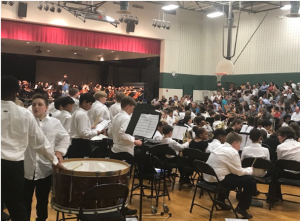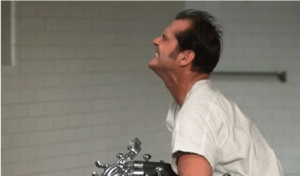Are we who we were?
Does culture shape how we communicate with one another?
As my kids’ school year wound to a close, I recently engaged in a little generational juxtaposition. While I stand 40 years removed from high school, my teen/tween daughters—by contrast—stand at the precipice of life, dangling their toes in the water of freedom and experimentation. In thinking about our two different stages, I considered how life experiences shape how we relate to other people.
Experiences impact our psyche and effect how we communicate. Recently, my kids really enjoyed two musical experiences with their peers—one as a spectator and the other as a participant. What they gained from each provided a sharp contrast between their current culture and that of my youth. Neither were/are perfect and mean teens still exist…on campus and in the White House.
But I see signs of improvement.
My older daughter attended her high school’s “Coffee House”, showing up to support some friends who were participating in informal, on-stage performances. I thought little of it as I dropped her off at the Grady steps. But upon her return home, my nonchalance ceased. She energetically began scrolling through her phone to give us a taste of her evening.
Some acts were truly impressive; others not so much. But what resonated with me was the sizable crowd in attendance. They were warm, enthusiastic, loud, and respectful. The teens on stage stood figuratively naked, with little separating them from friends and family. But they sang, recited poetry, and danced—sharing their talents and their souls with their intimate audience.
I was heartened by what I heard but more so by what I didn’t. No catcalls, criticisms, slurs, or jeers. No laughing, no shouts of derision, no boos.
Forty years ago, an event like that would likely have been an evening of derision that would endure for days and weeks to come. “Does your voice always crack?” “You did that instead of getting high with us?” “Nice dancing, faggot.”
Cue performance #2.
A few days later my younger daughter played trumpet in her middle school band concert. Three different bands performed, each had their own spot in the Inman gym surrounded by parents, teachers, and siblings seated in the stands and on the floor.
It was a hot and humid Atlanta night. But they played on, alternating songs among the three bands with more than 500 people craning to see their kids and hear their music.
Again, what captured my attention that evening was the reaction of the kids. They were dressed in their black and white best. The gym was packed for the final show of the season. With every selection, I fully expected that the noise of the two bands not playing would compete with their playing counterparts amid a rising tide of whispers, chair-shifting, and giggled during each song.
 But there was none of that. When one band played, everyone listened. The non-performing kids were quiet, engaged, and at the close of every song, enthusiastically applauded their peers. The sight of a gym full of tweens laughing, clapping, and enjoying the efforts of each other was unexpected.
But there was none of that. When one band played, everyone listened. The non-performing kids were quiet, engaged, and at the close of every song, enthusiastically applauded their peers. The sight of a gym full of tweens laughing, clapping, and enjoying the efforts of each other was unexpected.
I kept returning to my own teenage experiences.
These kids are different. Their culture—like ours—impacts them. But they applaud when their friends they take a chance. It matters little to them that boys like boys, whites like blacks, or kids decide that their previous gender doesn’t work well for them.
Don’t get me wrong. They have baggage like all of us.
We may have cursed those unlike us; beat them up; and shunned them like lepers.
More often than not, these kids don’t.
Thank God they’re culture is shaping them. And thank God many of us outgrew what ours once was. Hope comes slowly to a cynic like me. But maybe, just maybe, there’s hope yet.
Their willingness to take risks recalled a scene from one of my favorite movies, One Flew Over the Cuckoo’s Nest. In it, R.P. McMurphy (Jack Nicholson) is playing cards in the large shower room of a psychiatric hospital. The leader of a forlorn pack of men in this institution, McMurphy is constantly looking for action and exhorting his downtrodden peers to join him.
 At the center of the shower room is a massive marble sink that looks as portable as a 1972 Buick Electra. McMurphy bets his buddies that he can lift it from its base, toss it through the window, walk downtown, grab a beer, and watch the ball game. Gradually, he convinces them to wager…against him.
At the center of the shower room is a massive marble sink that looks as portable as a 1972 Buick Electra. McMurphy bets his buddies that he can lift it from its base, toss it through the window, walk downtown, grab a beer, and watch the ball game. Gradually, he convinces them to wager…against him.
With his wild eyes and hospital scrubs, he approaches the square pedestal, grasps it on either side, and lifts, pitting old-man strength against an immovable object. His face reddens, his veins pop, his teeth clench.
Nothing.
After three strenuous attempts, it doesn’t move a millimeter. He finally lets go and ambles dejectedly to the door. But before exiting, he slowly turns, looks back at his motley crew and says, “But I tried didn’t I, goddammit… at least I did that.”
He did. And like my daughters and their friends, he’s to be applauded…supported.

